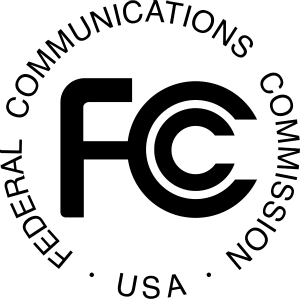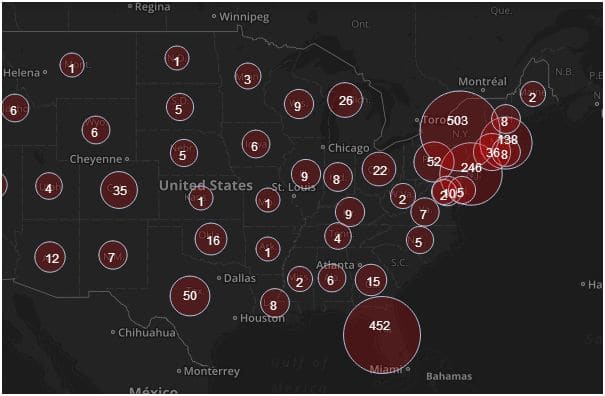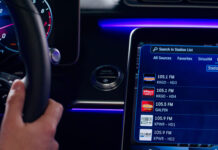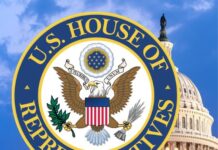
Earlier this week broadcast equipment from two pirate radio stations in Boston was seized in a joint operation involving the FCC, the U.S. Marshals Service, and Boston Police Department. The announcement came from the Department of Justice. Boston, Miami, and New York have the greatest concentration of pirate radio activities. Here’s an FCC map of all the known pirates…

Here are the details about today’s seizure…
“Big City,” which broadcast at times on 100.3 FM, 105.3 FM, and 101.3 FM, from Dorchester, with a studio in Roxbury, and “B87.7 FM,” which operated on 87.7 FM from Dorchester, were operating without a license. The FCC issued multiple warnings to the illegal operators, but the radio stations continued to broadcast. Pursuant to federal forfeiture actions, authorities seized equipment operated by each radio station at that station’s antenna location on Blue Hill Avenue in Dorchester. The forfeiture actions were brought after the FCC received complaints, including a complaint from a licensed broadcaster about interference with its radio signal.
“When pirate radio stations refuse to cease operations, despite multiple warnings, action must be taken,” said United States Attorney Andrew E. Lelling. “It is a public safety hazard for illegal radio stations to broadcast, potentially interfering with critical radio communications. We will work in conjunction with the FCC’s Enforcement Bureau to identify violators of federal communications law.”
“Pirate radio stations are operating without an FCC license — and therefore breaking the law, as well as interfering with licensed broadcasters and potentially preventing those broadcasters from delivering critical public-safety information to listeners,” said Rosemary Harold, Chief of the FCC’s Enforcement Bureau. “We are pursuing multiple legal routes to stop pirate broadcasters; the seizure action in Boston is just one of them. We thank our partners in the Massachusetts U.S. Attorney’s Office and U.S. Marshals Service, and we’re particularly thankful for the great work of FCC field agents in combating this problem.”









And 2022, B87 is still strong and running!
You can get some AM stations (even in big urban areas) for a song these days. Or better yet, start a non-profit organization and have them DONATE the station for the tax write off.
Also: And what’s with all these LPFMs popping up simulcasting bigger, established stations? I though these stations were supposed to be low power community stations?
I tend to agree with the ridiculous low power of part 15. I think too the FCC should be more relaxed and lenient/allowing depending on the situation of the activity. Like myself as an old broadcaster and engineer, I have no interest in “Pirating” the radio broadcast spectrum but I love working/tinkering with broadcasting equipment and testing/playing with it on occasion. Living in a distant rural area not anywhere close to any large markets and radio businesses, there isn’t anything to interfere with. My transmissions are not that of a full time illegal operation. No profit gaining and as an engineer I know how to properly work with the stuff. I am disabled and repairing and hobbying with something I love is what keeps me from insanity. I have good relations with the commercial stations and most all of them know me and that I work with old radio stuff. It has never been my intent to thumb my nose at the regulatory authority of the FCC.
The power rules really need to be changed for Part 15. You really can’t broadcast on FM with those crazy low power levels. Power levels should be changed to 1 watt for FM as long as you’re not interfering with a licensed station. For AM the power level should be 10 watts. If the power levels were more sensible for Part 15, you may not as many pirates broadcasting at high power interfering with other stations. The law for part 15 is actually the problem. More reasonable power levels or micro power should be allowed for Part 15. They really make it too easy to break the law.
Big A lets run with your analogy and compare it to my LPFM application. Drivers license. Lets say you take your drivers ed class and pass. Lets say you take the written and driving test and pass. Oh, and you pay your fee. You cover all your bases, doing what you’re supposed to. And then somebody steals your license from the mail before you get it. And then the DMV says sorry it was lost in the.mail, but we can’t make you a new one until you come take drivers ed again, pass all the tests again, and pay another fee. Oh, and since we have run out of drivers licenses you’re gonna have to wait a decade or.more until we print some.new ones. Oh, but wait. We reached the limit on licenses. No more available. You’re screwed. Sorry. Now go away…
Why doesn’t the FCC drop their mighty hammer on the hundreds of AM stations that are operating illegally using their daytime facilities 24/7 and the daytimers running 24 hours. It’s turned into total chaos on AM driving listeners away and hurting the stations that play by the rules. No wonder the AM band needs revitalizing when there are so many stations thumbing their noses at the FCC.
I agree with this idea. I live in Sylvania (Toledo) Ohio and listen to WJR-AM 760 in Detroit frequently. I heard a station under their signal which turned out to be from Knoxville, TN., WETR -AM 760 which is a 2400 watt daytimer. I heard their call sign at the top of the hour when WJR was silent for a second or two. I know the engineer at WJR and told him of the problem. He said he has trouble with them before running at night and would contact them.
The property the operate from should also be seized locked and sold at auction
I don’t see the west coast on the map. In Los Angeles there are several LPFM and translators added within the past couple of years. Some on popular pirate frequencies. There is one pirate on 87.9 that plays Gunsmoke episodes and has been on for roughly 10 years.
Also well said!
I think I was listening to 100.3 back in November. Better music than most of what was on legal radio.
There are many schools, businesses and radio hobby enthusiasts who experiment with FCC LEGAL Part 15 broadcasting. They accept the limited range and it suits their needs and desires, be it campus-limited broadcasting, shopping plaza or tourist attraction informational radio or legal micro-neighborhood radio. Pirates not only give legal Part 15 radio enthusiasts a bad reputation they cause other issues as well, such as harmful interference.
Reynolds Chase brings up a good point about internet radio, but the ridiculous fees for a pureplay (ie, non-broadcast radio webstream) make it impossible and impractical to get a large audience without expending substantial sums with licensing, thanks to the per listener/per song model. Part 15 radio, though with a limited audience, costs no more than purchasing a Part 15 certified AM transmitter and any peripheral equipment one may like.
As a 44+ year broadcast engineering veteran I not only use a Part 15 transmitter as a test bed for developing and experimenting with audio processing but I use it to mentor young people with campus-limited student radio. Sadly, I have seen one legal Part 15 enthusiast receive a NOUO in spite of the gent, a licensed amateur, using a factory fresh Part 15 certified AM transmitter (which at the time was offered by a well known broadcast equipment manufacturer). Any mention of Part 15.219 was conspicuously absent from the NOUO which makes me believe that a licensed broadcaster “wagged the dog” and somehow felt threatened by this radio hobbyist. I fully agree that clear enforcement actions need to be taken against blatantly harmful and illegal pirates there needs to be a distinction made between blatant operators and legal Part 15 radio enthusiasts.
The UK based Citrus3.com has been offering unlimited online bandwidth and listeners for half price. Which is $25 a month. The only other costs are performance royalties and DMCA SoundExchange royalties (if music is involved) which can probably be had for a hobbyist rate of around $60 a month. Some operators will try to fly under the radar with those as well and wait until and if someone comes calling and asking for them to pay.
Point being it’s incredibly inexpensive to stream a full time station with a potentially greater audience than any Pirate can ever hope for locally.
C.Crane radio offers an FM transmitter the size of a pack of cigarettes for $50.00 Easy way into Part 15 broadcasting.
Sigh … You can get an internet radio station up and running with unlimited listeners for $25 a month plus licensing fees and broadcast to a worldwide audience OR you can goof around with some outdated, romanticized idea that a pirate radio station like these with a fraction of the reach and 20 listeners is somehow still cool to do. Bottom line: You can’t fix stupid.
Well said!
You think pirates don’t stream? The one mentioned in this article does. Do a search for Big City Radio Boston and you’ll see it. They don’t run this station because they think it’s a “cool thing to do.” They do it to make money. These pirates aren’t stupid. They’re pros who have outwitted the FCC for years. And they have a whole lot more than 20 listeners.
Thing is here that radio seems to be the only business that the government protects from competition. The American dream for many is about starting their own business. If you are better than the competition, you put them out of business. But with radio is doesn’t matter if you are better. With radio, the FCC stifles competition by letting a handful of broadcasters hoard stations.
And when the FCC finally decided to open a window for small guys to apply for an LPFM license, existing broadcasters do everything possible to keep them from getting licenses. Even using deceitful promises and outright fraud to trick folks such as myself into withdrawing our LPFM applications to open channels for their money-making translators.
So that justifies someone to break the law? I’m not sure I follow your logic.
One must have a driver’s license to drive a car. Driving a car is important to getting a delivery job. So does that justify a 12 year old kid to just drive a car without a license because he’s too young?